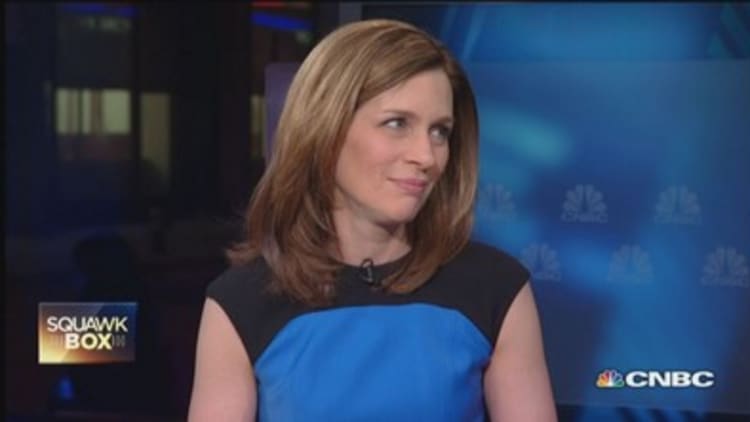
If you're banking on a fat inheritance from your parents, you'd better have a Plan B.
Wealth managers say retirees today are far more focused on meeting their own living expenses than leaving a financial legacy behind. And those who do have assets to spare are increasingly inclined to gift to charity or to skip a generation and name their grandchildren as beneficiaries to their estate.
What's fueling the trend? A confluence of factors, said Laura Mandel, national director of specialized trust services for Northern Trust, which hosted a recent panel on the changing wealth-transfer paradigm.
For starters, said Mandel, Americans are living longer and incurring greater expenses than prior generations, particularly where health care is concerned.
Read MoreDon't leave Uncle Sam your cash
Projections indicate that the average couple retiring today will see 67 percent of their Social Security benefit absorbed by medical-care costs. For couples retiring 10 years from now, that figure jumps to 90 percent, according to HealthView Services, which develops health-care cost-projection software.
"This is happening at a time when company pension plans for retirement are disappearing, so even the wealthy are more cognizant and cautious about spiraling health-care costs," said Mandel, noting that the risk of retirees outliving their money is greater still because so many of them have under-saved.
Fears of downsizing
The Center for Retirement Research at Boston College finds that 52 percent of U.S. households are at risk of not having enough to maintain their standard of living in retirement.
According to Mandel, the growing emphasis on wealth retention took root during the economic crisis between 2007 and 2009, when millions of Americans saw their portfolio values plunge and housing wealth evaporate. The recession was particularly harsh to retirees, who no longer generate an income and were forced to liquidate part of their nest egg into a down market.
Read More8 ways to stay rich
"It really started with the Great Recession, when investors experienced a steep decline in assets," Mandel said. "With safety nets like defined benefit [pension] plans no longer there, concerns surrounding future Social Security benefits and spiraling health-care costs, there's now a real concern about having to downsize in lifestyle during retirement."
But wealth planning in the current environment isn't solely dictated by fear.
It has also been altered by the financial mind-set of the youngest retirees—the baby boomers who have supported their adult children much longer than prior generations.
"Many of my clients do not plan to leave anything behind by plan," said Michael Sangirardi, a certified financial planner with Bryant Park Wealth Advisors. "The common theme has been to help while you are alive.
"Many have paid for college, grad school [and] weddings and have bailed children out of credit card debt," he added. "I have found a big change to not wanting to leave money behind, but instead to spend it and help if they can now."
Boomers, Sangirardi said, are using their retirement savings to pursue their own passions and make the most of their golden years, including taking college courses, starting business ventures and traveling.

In response to changing priorities, Steve Branton, a CFP who works with high-net-worth clients in San Francisco, said the safe portfolio withdrawal rate for retirees at his office now assumes that their assets will be fully depleted after 30 years.
"Only if the client wants to leave the principal to their heirs do we deduct a fraction of a percent of the safe withdrawal rate," he said.
John Gajkowski, a CFP with Money Mangers Financial Group, has observed a similar phenomenon, noting many baby boomers feel they've "done enough" for their kids. But there's a selfless motivation to keeping more of their hard-earned savings, too.
Read MoreStuck in sandwich generation
"Previous generations believed that the kids took care of the parents when they got older, but baby boomers don't believe that's the way it should be, and for themselves they want to be far more independent," he said. "They don't want to be a financial or physical burden to their kids."
As a result, boomers are highly motivated to stretch their limited dollars further, using tax-efficient withdrawal strategies and "leveraging up," using life insurance-based or asset-based annuities to cover future medical expenses rather than relying exclusively on traditional long-term-care insurance.
Heirs not apparent
They are more willing to deplete their nest egg if it means securing their own financial future, Gajkowski said.
Mandel said client services at Northern Trust have evolved to meet the needs of the changing family dynamic, as well.
With many Americans getting married and having children later in life, she said, retirees are increasingly less likely to have an adult relationship with their grandchildren or ever meet their great-grandchildren.
Absent the opportunity to have heartfelt conversations with their progeny about how their wealth was derived, Mandel's office is spending more time helping clients put their financial, philanthropic and educational values into writing.
I definitely see more planning clients who don't have an interest in leaving money to their kids.Kristi Sullivancertified financial planner, Sullivan Financial Planning
Grandparents who are setting up a long-term trust for their descendents, whom they will never know, for example, are advised to include a statement of intent with their estate documents, which informs future generations (and their trustee) about their sense of responsibility and perspective on wealth.
Indeed, wealth planning today looks very different than it did 20 years ago.
Fewer kids to inherit
Faced with longer life expectancies, a savings shortfall and skyrocketing medical bills, retirees are increasingly reluctant to transfer assets to their children during their lifetime—lest they need that money to make ends meet.
Where excess assets exist when they die, many are also more likely to give to a worthy cause or skip their children and name their grandchildren as beneficiaries instead.
It's a trend that CFP Kristi Sullivan of Sullivan Financial Planning expects to continue.
"I definitely see more planning clients who don't have an interest in leaving money to their kids," she said. "Many are worried that they will outlive their assets, so inheritance is the least of their concerns.
"Others feel that the possibility of an inheritance robs kids of the motivation to earn and save on their own," Sullivan added.
—By Shelly Schwartz, special to CNBC.com




